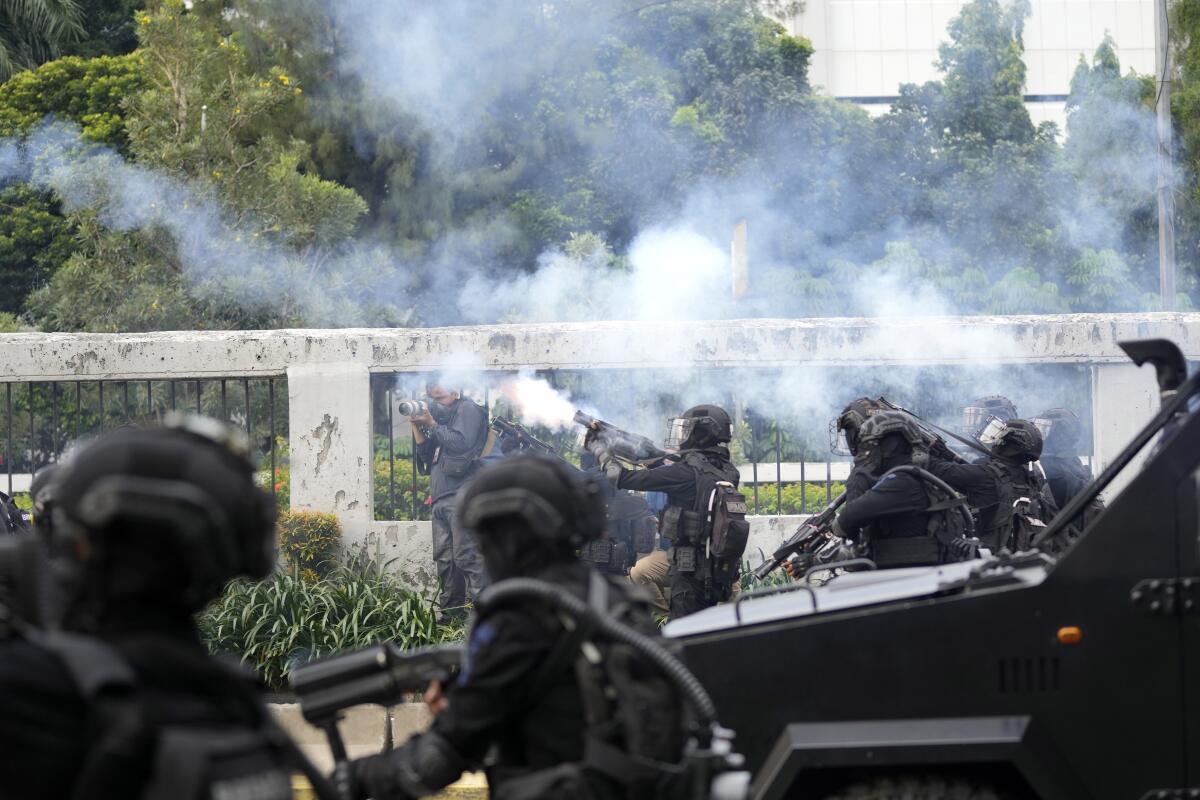Indonesian students protest rumored delay of 2024 election

- Share via
JAKARTA, Indonesia — Thousands of students marched in cities around Indonesia on Monday to protest against rumors that the government is considering postponing the 2024 presidential election to allow President Joko Widodo to remain in office beyond the two-term legal limit, calling it a threat to the country’s democracy.
They demonstrated in front of the Parliament building in the capital, Jakarta, where police used tear gas and water cannons to try to disperse the crowds, and in large cities all over the country.
Widodo denied on Sunday that his administration is attempting to delay the vote after senior politicians, including a close ally, supported the idea, and ordered the Cabinet to explain that the election has been set for Feb. 14, 2024.
“This needs to be explained so that there are no rumors circulating among people that the government is trying to postpone the election, or speculation about the extension of the president’s tenure or a related third term,” Widodo said at a Cabinet meeting on election preparations.
Authorities in Jakarta blocked streets leading to the heavily guarded presidential palace and Parliament building, where protesters marched to demand that lawmakers not delay the election or amend the constitution to allow Widodo to run again in 2024.
“We demand that the lawmakers do not betray the country’s constitution by amending it,” said Kaharuddin, a protest coordinator. “We want them to listen to people’s aspirations.”
Most of the students began to disperse peacefully after representatives of lawmakers approached them and vowed to protect the constitution and ensure there will be no postponement of the election.
However, hundreds of non-student protesters tried to force their way into the building by throwing rocks and bottles at police, who responded with tear gas and water cannons, witnesses said.
“We want to ensure the safety of the students who want to voice their aspirations as guardians of democracy,” said National Police Chief Listio Sigit Prabowo, “But we must also secure this process so that no intruders can use this action to create chaos.”
Presidents are limited to two terms under the first amendment to the Indonesian Constitution, which was passed in 1999, a year after dictator Suharto was toppled by massive pro-democracy protests.
The protesters chanted about protecting the country’s democratic progress, and also against soaring fuel and food prices.
Similar protests occurred in other cities, including Bandung, Yogyakarta, Makassar and Pontianak.
The protests are not associated with any particular party or group, and are led by students, who historically have been a driving force of political change in Indonesia. Student demonstrations in 1998 triggered events that led longtime strongman President Suharto to step down.
Powerful political figures, including Cabinet ministers Luhut Binsar Pandjaitan and Airlangga Hartarto, who is also chair of the Golkar party in the governing coalition, have suggested that the election should be delayed.
Suharto ruled Indonesia for more than three decades under an authoritarian, often violent regime. During his rule, corruption and rights abuses became rampant as the elite plundered the economy. His downfall ushered in democracy, and the term limit is meant to prevent a repeat of the authoritarian past.
Last Wednesday, Widodo told his Cabinet to focus on addressing rising inflation instead of stirring controversy over the election.
“Nobody should bring up a (presidential) term extension or election delay anymore. No more!” Widodo said.
Widodo said last June that he plans to adhere to the constitution, after his supporters began rolling out the idea that his tenure could be extended through a constitutional amendment or election delay.
Supporters argued that Widodo needs more time to deal with the economy, which slumped during the pandemic, and complete his agenda, including a $35-billion project to relocate the capital to the island of Borneo.
Despite denials, doubts about his intentions have persisted.
“People are still skeptical about Jokowi’s indecision regarding the third term,” said Ujang Komarudin, a political analyst at Al-Azhar Indonesia University, using Widodo’s popular nickname. “The alleged plans have deviated far from the constitution and would be a major blow for Indonesia’s democratic reform.”
More to Read
Sign up for Essential California
The most important California stories and recommendations in your inbox every morning.
You may occasionally receive promotional content from the Los Angeles Times.










